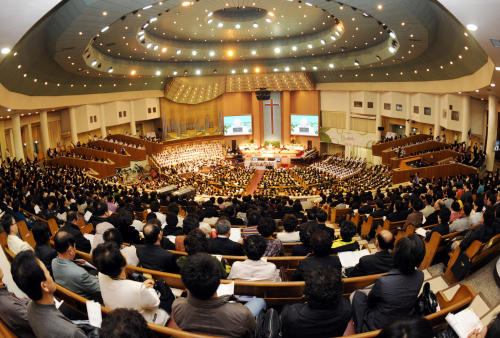Protestant church leaders call for reform of churches, organizations riddled with corruption and infighting
Easter Sunday is one of the most sacred Christian holidays. But this year, it became a day for repenting of the infighting and trouble within Protestant churches.
South Korea has one of the fastest-growing Protestant populations in the world. Christian missionaries first landed here in 1885. Today, nearly 8 million Koreans are Protestant.
Two leading Protestant organizations, the Christian Council of Korea and the National Council of Churches, have hosted a joint worship on Easter Sunday in areas such as Seoul Plaza since 2006, attracting hundreds of thousands people each year.
But this year, the service took place for the first time in an indoor venue, Yoido Full Gospel Church in Seoul, with some 15,000 people attending.
Easter Sunday is one of the most sacred Christian holidays. But this year, it became a day for repenting of the infighting and trouble within Protestant churches.
South Korea has one of the fastest-growing Protestant populations in the world. Christian missionaries first landed here in 1885. Today, nearly 8 million Koreans are Protestant.
Two leading Protestant organizations, the Christian Council of Korea and the National Council of Churches, have hosted a joint worship on Easter Sunday in areas such as Seoul Plaza since 2006, attracting hundreds of thousands people each year.
But this year, the service took place for the first time in an indoor venue, Yoido Full Gospel Church in Seoul, with some 15,000 people attending.

Rev. Lee Shin-woong of Shinkil Evangelical church gave a sermon during the service, in which he criticized church organizations for corruption and misconduct.
“Church should guide the world, giving hope to people. But, today, people worry about our churches as we are in serious trouble,” Lee said.
His speech highlighted ongoing conflicts in the Christian Council of Korea, an umbrella body of Korean Protestant churches.
The Seoul Central District Court ordered last month the suspension of Rev. Kiel Ja-yeon, newly elected chairman of the CCK, from his duties for alleged bribery during his election campaign.
In December 2010, Kiel was elected the new head of the governing body, topping Rev. Lee Gwang-sun, former head of the CCK, by a large margin.
Lee and his followers, however, filed a court injunction, claiming that Kiel gave out money to woo voters.
Lee confessed that he had also distributed money to voters, noting that bribery has become the norm in the Christian organization.
Despite Seoul Court’s ruling, church leaders have failed to intervene and create a framework for power-sharing in the CCK.
Corruption and infighting are nothing new in Korean churches. As the size and number of churches grow rapidly, they have become vulnerable to problems.
Yoido Full Gospel Church, which boasts more than one million registered congregants, is one clear example of a mega church facing a series of internal leadership feuds.
Last week, Rev. Cho Yong-gi made an apology to some 12,000 churchgoers after a group of elders filed a petition seeking an investigation into Cho’s family on corruption allegations.
In 2008, Cho, former head of the mega church, stepped down from his post and appointed fellow senior pastor Lee Young-hoon as his successor.
The 75-year-old Cho, however, still controls the country’s biggest church, and his wife and sons direct several affiliated units of the church, including Kukmin Ilbo, a national daily newspaper, and Hansei University, in Gyeonggi Province.
With concerns mounting over the reports of corruption, some civic groups and Protestant pastors argue that Korean churches have far too much power.
“Churches are losing their principles, and becoming more interested in expanding. This is a bad sign,” said Son Bong-ho, a professor of theology at Kosin University, a conservative Christian university, in Busan.
Son added that he believes that the troubled church governing body should be dismantled for the sake of Protestantism in Korea.
“Effective reform is impossible without disbanding the entire Christian Council of Korea, because corruption has been institutionalized far too long,” he added.
The Christian Alliance for Church Reform, a local civic group, agrees that the CCK has lost its capacity of “self-discipline and self-purification.”
“CCK has failed to get rid of people accused of wrongdoing. Instead, they’re trying to dismiss people who raised the issue,” said Nam Oh-sung, director of the Christian Alliance for Church Reform.
Nam added that it was time to disband the CCK and reduce the scale of mega churches in order to resolve the ongoing problems in Korean Christianity.
“Korean churches are now out of control, because those in authority within the churches have too much power. Churches have now become like a modern day tower of Babel. We need to reduce the power and pull down the tower,” he added.
By Oh Kyu-wook (596story@heraldcorp.com)
















![[KH Explains] Hyundai's full hybrid edge to pay off amid slow transition to pure EVs](http://res.heraldm.com/phpwas/restmb_idxmake.php?idx=652&simg=/content/image/2024/04/18/20240418050645_0.jpg&u=20240418181020)

![[Today’s K-pop] Zico drops snippet of collaboration with Jennie](http://res.heraldm.com/phpwas/restmb_idxmake.php?idx=642&simg=/content/image/2024/04/18/20240418050702_0.jpg&u=)